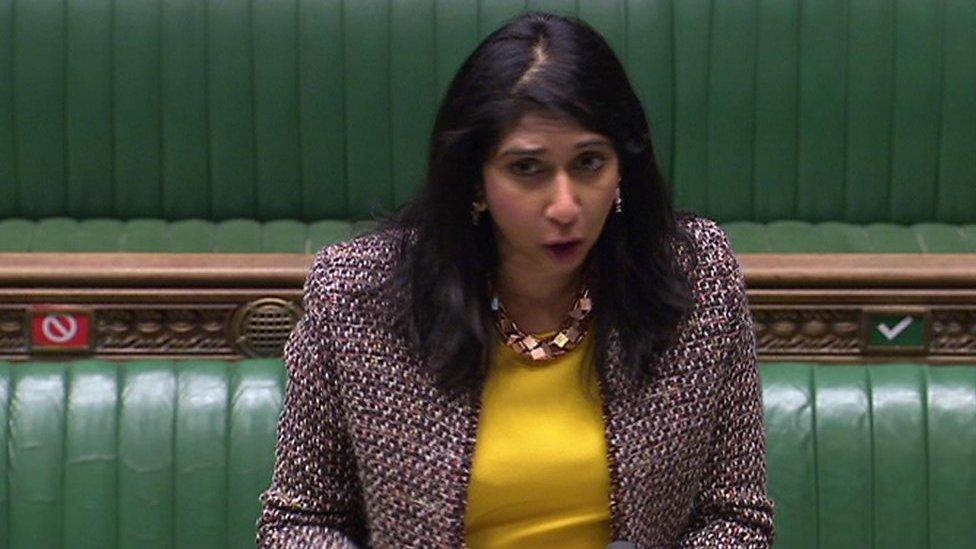Brexit: Gina Miller says 2017 ruling no legal defence for government
- Published

Gina Miller has won two victories at the Supreme Court over Brexit
Gina Miller has said the government is wrong to use Parliamentary sovereignty as its legal defence for attempting to over-ride the EU withdrawal agreement.
Ministers say Mrs Miller's 2017 court victory over Brexit upheld the "fundamental principle" that Parliament is sovereign in domestic law and can legislate to breach treaty obligations.
But Mrs Miller says the two issues were "intellectually and legally distinct".
The 2017 ruling, she said, reinforced the "importance of the rule of law".
Mrs Miller was at the centre of a landmark legal battle in which she challenged the then PM Theresa May's right to invoke Article 50 - which began the process of leaving the EU - without the express approval of Parliament.
The Supreme Court unanimously ruled in her favour.
The court's verdict is now being cited by Boris Johnson's government as the legal basis for proposed legislation which would change key aspects of the EU Withdrawal Agreement - the legally-binding treaty which set out the terms on which the UK left the EU on 31 January - in the event of the two sides not agreeing a future trade partnership.
The controversial Internal Markets Bill, to be debated later this month, would give the government the power to modify or scrap provisions relating to the Northern Ireland Protocol governing trade between Northern Ireland and Great Britain and UK government support for Northern Irish businesses.
The move has sparked anger across Europe, with Ireland's Europe minister saying on Friday that for the UK to "renege" on a legally-binding agreement was an unprecedentedly "provocative" act.
'Surprised and disappointed'
And Mrs Miller said she was "surprised and disappointed" that ministers were using the 2017 Supreme Court ruling as legal justification for what she said were their "arbitrary" actions.
"The issue of Parliamentary sovereignty is intellectually and legally distinct from international treaty obligations entered into by Her Majesty's government," she said.
The 2017 ruling, she added, "stands for the importance of the rule of law, something that this government seems determined to undermine".
Mrs Miller was also instrumental in another successful legal challenge last year, in which she thwarted the government's attempt to suspend Parliament for five weeks.
While the financier describes herself as a transparency campaigner, critics say she was always opposed to the UK's departure from the EU following the 2016 Brexit vote.
'Binding obligations'
In a statement released on Thursday, external, the government said it continued to stand by the "established principle" of international law that a state is obliged to discharge its treaty obligations in good faith.
However, it said the UK now found itself in "exceptional circumstances" and when Parliament ratified the Withdrawal Agreement earlier this year, the legislation used to do it "expressly confirmed" its power to pass provisions taking precedence over the Agreement.
"Parliament is sovereign as a matter of domestic law and can pass legislation which is in breach of the UK's treaty obligations," it said.

Attorney General Suella Braverman has said the government is entitled to do what it is doing
"Treaty obligations only become binding to the extent that they are enshrined in domestic legislation. Whether to enact or repeal legislation, and the content of that legislation, is for Parliament and Parliament alone."
This principle, it stated, had been "approved" by the Supreme Court in its 2017 ruling.
This interpretation has been disputed by some leading lawyers, raising the possibility of another legal challenge before the end of post-Brexit transition period on 31 December.
There have been unconfirmed reports of a split among the government's three chief law officers over the question of whether ministers would find themselves in breach of the ministerial code by proposing legislation that was explicitly in defiance of international law.
The Guardian claimed, external that both Attorney General Suella Braverman and her deputy Michael Ellis had argued that it would not but that Lord Keen, the Advocate General for Scotland, had taken the opposite view.
Lord Keen, who represented the government in the 2017 case, has defended its actions in recent days. He told the Lords no breach of UK law was being proposed and the government was duty-bound to "discharge its obligations" to Northern Ireland if they could not be resolved through the EU-UK dispute resolution process.